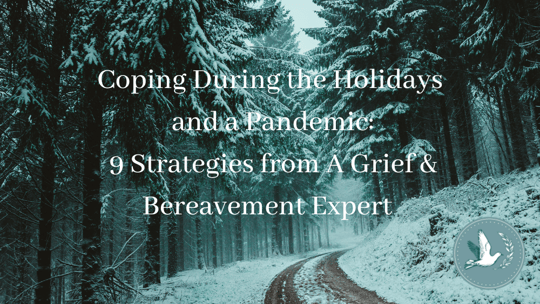Coping During the Holidays and a Pandemic: 9 Strategies from A Grief & Bereavement Expert
By AccentCare
The holidays are usually a time of joy and togetherness. We all know that even under normal circumstances this season can also be challenging. We also know that we are not living an ordinary year. The truth is we live in incredibly challenging times.
If you have read any of our posts during the COVID-19 pandemic, you have learned about compounded grief and stress. When we use the word compounded here, what we mean are all the losses and stressors that are piling on top of each other. Maybe we’ve lost a sense of overall safety, our health, our jobs, food security, our familial and religious rituals, our communities and social engagement, or even the loss of loved ones.
Some of us carry our compounded loss and stress on our shoulders. In this case, we might feel depressed and debilitated by the heaviness weighing down on us. Others try to dodge grief and distress only for it to continually boomerang back to us. In this case, it is easy to feel intense exhaustion and frustration.
There are very real things you can do to add joy and hope to this holiday season:
- Grieve Intentionally: Grief is a natural response to our losses, and grieving is part of our healing. The problem with compounded losses is that the grief is too overwhelming to process. To manage so many losses, we must grieve intentionally. Try to focus on only one or two of your losses over this holiday season. This will help you manage the wide range of emotions and thoughts that you might experience.
- Plan and Over-Plan: We highly recommend following public health recommendations about gatherings and social distancing. So, it is critical to try to find safe ways to make plans. It is generally better to over-plan and cancel later than to under-plan and be left scrambling at the last minute. This is a way to prepare yourself for what you anticipate might be hardest.
- Ask for Help: It’s okay to do things differently this year. It is okay to delegate responsibilities and ask for help. Sometimes people really want to help in any way they can, but they just may not know what to offer. By asking for help, you really are giving others a chance to support you; at the same time, you get some relief.
- Break the Silence: You may find yourself in a common situation where people no longer talk about your loved one who is not there. Your friends and family may not want to upset you, when all you want is to talk about the person you miss so much. Make it okay for yourself and others to talk about your loss by saying their name and sharing stories. People in your life will take their cue from you.
- Share Memories: Feel empowered to share stories, pictures, and memories whether that be on social media or during conversation. This is how we stay connected to people whom we have loved and lost.
- Embrace the Bittersweet: Even if you are anticipating a difficult holiday season, try to seek pleasure in the things and relationships that are special and meaningful to you.
- Use Rituals: Do what is familiar or create new rituals this year. You can invite others to be a part of them or participate in them alone, there is no wrong way to do this.
- Focus on Impermanence: For some types of grief or pain, there is reason to be hopeful. The COVID-19 pandemic will end. There will be a future of togetherness and joy again. We will be able to gather again with our loved ones without masks and without social distancing. There will be some sense of normalcy. By focusing on the principle of impermanence, we can reflect on the reality that change is built in the fabric of our existence and when embraced can create beautiful moments for humanity.
We want to leave you with a parting sentiment. It is important to give ourselves grace in the face of seasonal pressure. Grieving during the holidays is hard any year and grieving during the holidays during a pandemic is harder. In spite of the extraordinary challenges, our hope is that you can find meaning, connection, and peace during this holiday season.
 About the Author: Joshua Magariel, LCSW, is a National Director of Patient Experience at Seasons Hospice & Palliative Care. Josh specializes in grief and loss education and support as well as marriage and family therapy. Josh is a national presenter and author on creative applications of attachment theory in grief therapy. Josh earned his B.A. in Religious Studies at the University of Kansas and his MSW at the University of Denver. Josh has completed an AAMFT accredited Certificate in Marriage and Family Therapy from the Denver Family Institute. Josh is a ten-year veteran of hospice having served in patient care, bereavement, leadership, and education.
About the Author: Joshua Magariel, LCSW, is a National Director of Patient Experience at Seasons Hospice & Palliative Care. Josh specializes in grief and loss education and support as well as marriage and family therapy. Josh is a national presenter and author on creative applications of attachment theory in grief therapy. Josh earned his B.A. in Religious Studies at the University of Kansas and his MSW at the University of Denver. Josh has completed an AAMFT accredited Certificate in Marriage and Family Therapy from the Denver Family Institute. Josh is a ten-year veteran of hospice having served in patient care, bereavement, leadership, and education.